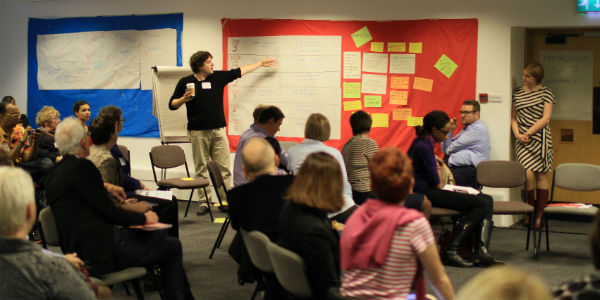We’re taking back control – but who’s going to wield it?
Britain voted to ‘take back control’ from the EU, and Theresa May’s Lancaster House speech made the repatriation of power to Westminster a priority. But it is far from clear what kind of Brexit Britons want, nor how many of these powers will go to Scotland, Wales and Northern Ireland rather than the UK Parliament. Katie Ghose argues that with direct democracy on the rise, citizens’ assemblies would help people grasp the trade-offs at stake and have a voice in these monumental decisions.

NHS staff work on ideas for a Citizens’ Assembly in 2013. Photo: NHS Citizen via a CC-BY-NC-SA 20 licence
Theresa May has now fleshed out her plans for Britain to leave the EU and become an independent, self-governing nation. With more detail emerging about the economic plan, it’s time to look at the democratic implications.
Serious thinking about democracy can all too often get left behind and the public shut out of these debates, as we’ve seen with English devolution. How our democracy actually takes shape after Brexit goes beyond the two-year negotiating window, and it has to mean the public will have a strong say. After all, given the focus on ‘where power lies’ during the campaign (summed up the powerful slogan ‘take back control’), it would be ironic if this wasn’t a priority.
Theresa May says the vote was about restoring parliamentary democracy by bringing back sovereignty to the UK Parliament. This is uncontroversial – after all, many people identified the issue of laws ‘being made in Brussels’ as part of a more general unease. But it is only part of the picture. The transfer will take place at the same time as the ongoing transfer of powers from Westminster to Scotland, Wales and NI, as well as devolution within England. In other words, it will happen just as power is shifting between and within the nations of the UK – with obvious ramifications for our Union.
People feel a physical remoteness from Westminster, Holyrood and the Senedd, but that distance is knitted into a growing anti-establishment sentiment. So now is an opportunity to capitalise on the positive political interest stimulated by the vote, and convert it into a sustainable mode of political engagement – with genuinely powerful citizens.
So the first question is this: what is the public role in shaping the form of Brexit?
The referendum should be the beginning, not the end, of the public’s involvement. True, the government is in a difficult position given the multiple interpretations of what Brexit means. And it is always a challenge to get a blueprint – after all, referendums are binary – and this case when the vote followed a short four-month campaign with both sides offering a wide range of potential outcomes. We are left with highly contested territory when it comes to the form of Brexit. Citizens’ assemblies – representative gatherings of people who are given the time and information to properly discuss and debate the issues in light of the facts – can be a good way of dealing with this, and for citizens to face up to the trade-offs that government is grappling with.
The second question is this: where will the powers ‘repatriated’ from Europe actually go? Theresa May confirmed that a Great Repeal Bill will bring all the powers the EU currently holds back to the UK. But given that we are a multi-national democracy, and one with a rightful focus on devolution, who will these powers actually be given to?
The PM said that ‘leaving the European Union will mean that our laws will be made in Westminster, Edinburgh, Cardiff and Belfast’. So it seems only right that the laws related to powers already devolved to the nations – Wales, Scotland and Northern Ireland – should ‘go’ there. And indeed May suggested as much. But could we go further? Is this a chance to rethink Britain’s constitutional future as an increasingly diverse and semi-federal union?
We can learn from local devolution on this question. The public haven’t had a strong role – and perhaps partly as a result of that, there is some evidence of devolution deals unravelling. So we should learn from what happens when powers are transferred without consulting on what they’re for.
The ‘where’ and ‘how’ of political power is sometimes just as important as the ‘what’. And that means Brexit is a great opportunity to involve the public in a conversation about where power lies within the UK.
So the final question has to be this: is it time we clarified what kind of democracy we are? Britain is holding more and more referendums. We therefore have to ask: how are different forms of democracy going to work alongside each other? It is time we had a clear plan for what happens after referendums – what Parliament’s role will be, what public consultation there’ll be on the next steps, and so on?
It’s looking as if referendums have become part of our institutional settlement – which is interesting, because it suggests direct democracy has been grafted onto an essentially representative democratic model – with the resulting lack of clarity over Parliament’s role leading to the most high-profile involvement of the judiciary in these decisions since the Supreme Court was created.
We are muddling through all of this. And how we handle it could affect many other decisions. As well as a clearer framework for future votes, a citizens’ assembly could provide a practical way to trial the need for deliberation and nuance that has to follow any binary ‘yes/no’ ballot.
We have some big democratic questions to tackle over the next couple of years. Getting to the bottom of them might be difficult, but one thing’s clear: all of us should be involved in answering these questions. The next two years, and potentially much longer than that, will be dominated by exit negotiations. Where power lies – for all of us as citizens – deserves every bit as much attention.
This post represents the views of the author and not those of Democratic Audit. It first appeared in a slightly different form at The Times.
 Katie Ghose is chief executive of the Electoral Reform Society.
Katie Ghose is chief executive of the Electoral Reform Society.





 Democratic Audit's core funding is provided by the Joseph Rowntree Charitable Trust. Additional funding is provided by the London School of Economics.
Democratic Audit's core funding is provided by the Joseph Rowntree Charitable Trust. Additional funding is provided by the London School of Economics.
An additional part of the problem of course is that once we have left the EU we will still have the same kind of group in charge who took us in in the first place or wanted us to remain in. So any new settlement will be the core of endless conflict. And the danger with “citizens’ assemblies” is really that they are just more of the same and a dangerous addition to the mix if done wrongly (which, alas, you can be pretty sure they will be) – who appoints these? Ultimately who pays them? Presumably they will be salaried? Or if not, they will have to have the motivation and time to offer so are being essentially paid elsewhere that allows them time off (government workers of course!)…or rich enough to not have to work. Are they elected? What % of the electorate will turn out for some vague idea about another assembly with no powers? – will it be a ‘great success’ like the Police commissioners?
The danger here, I can see, is that in regard to Brexit this would be another elite wheeze to collect a gang of mates and those who will ‘do the bidding’ under the guise of ‘the people’s champions’ (all paid in roundabout ways on various schemes by the elite already), stick them in a room, guide them to a conclusion and basically then trumpet “the people don’t want to leave the EU after all, that’s what our great CA says, after all they represent the people”.
If such an assembly opposed its paymasters, and decided on a tough approach to migration, that government graft and corruption over contracts and refusal to provide information on the basis of ‘commercial confidentiality’ had to be abolished ‘immediately’ and that Edward Snowden should be granted asylum today, that assembly would be swiftly and cynically abolished as ‘unrepresentative of the people’. So really we are no further forward – just a guided group of people who have some motivation to take part on behalf of the elite with some fig leaf pretence at independence, while the majority of voters would sit by bewildered at what it was all about. And whether these people were responsible for the drains in Altrincham.
When I served on the MPA as an elected politician, I got on very well with those described as ‘independents’ and they were good people every one, but in essence they were all government appointees – government paid their earnings from the body so they were always afraid to rock the boat – unlike the elected politicians (even if they sometimes did it for pure political reasons). That was how it was planned.
The voter wants to know where to go to to get redress when things go wrong. And who controls different things. Simplicity. Not yet more bodies they do not understand and that the media treats as a joke. At least we will not at some point be told endlessly by the elite as a code for EU control over these things that “we are working with out partners to ensure the best possible outcome” and never doing anything. Clarity is enough, restore the powers to the UK first and then decide. But on all the rest I agree…
Excellent piece from Katie Ghose. I really like the idea of citizens assembly having a part to play in helping the people in making democratic decisions. I also agree that it’s a brilliant time to look closer at democracy in the UK to make improvements.
I’m interested in the role “take back control” made to the Brexit vote. I see the dis-enfrachisement of the majority of us in the UK Parliament as the main reason why we don’t have control – rather than laws coming from Brussels. Many people who wanted “leave”, when interviewed, had difficulty naming EU laws they didn’t like. So, as I know Katie Ghose will agree, our priority at this time is to get proportional voting in place. Does she see citizens assemblies as one way of achieving that goal?